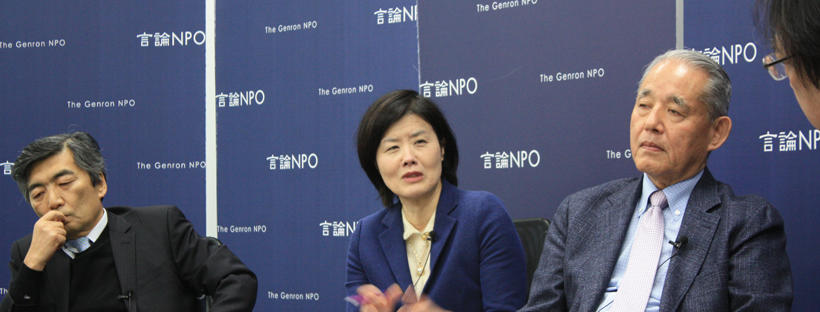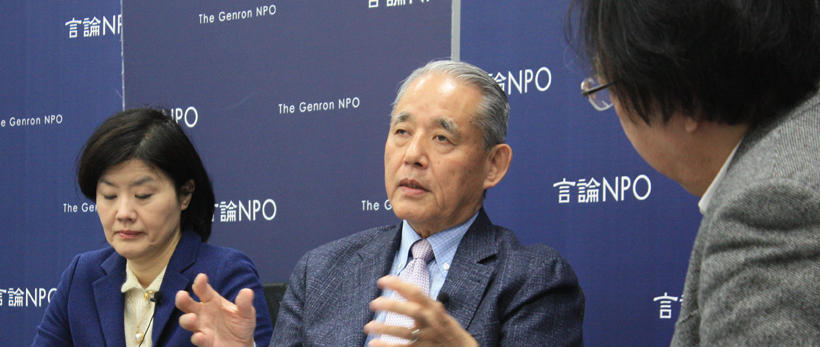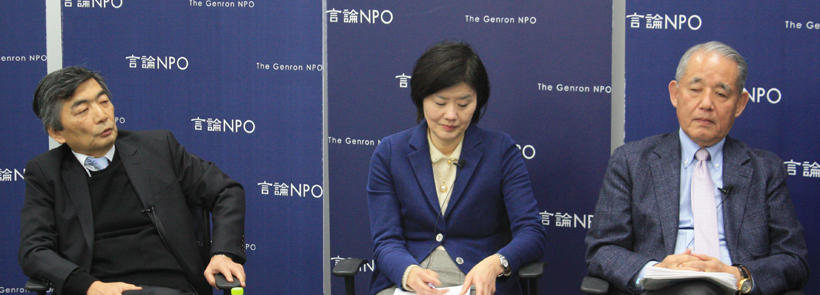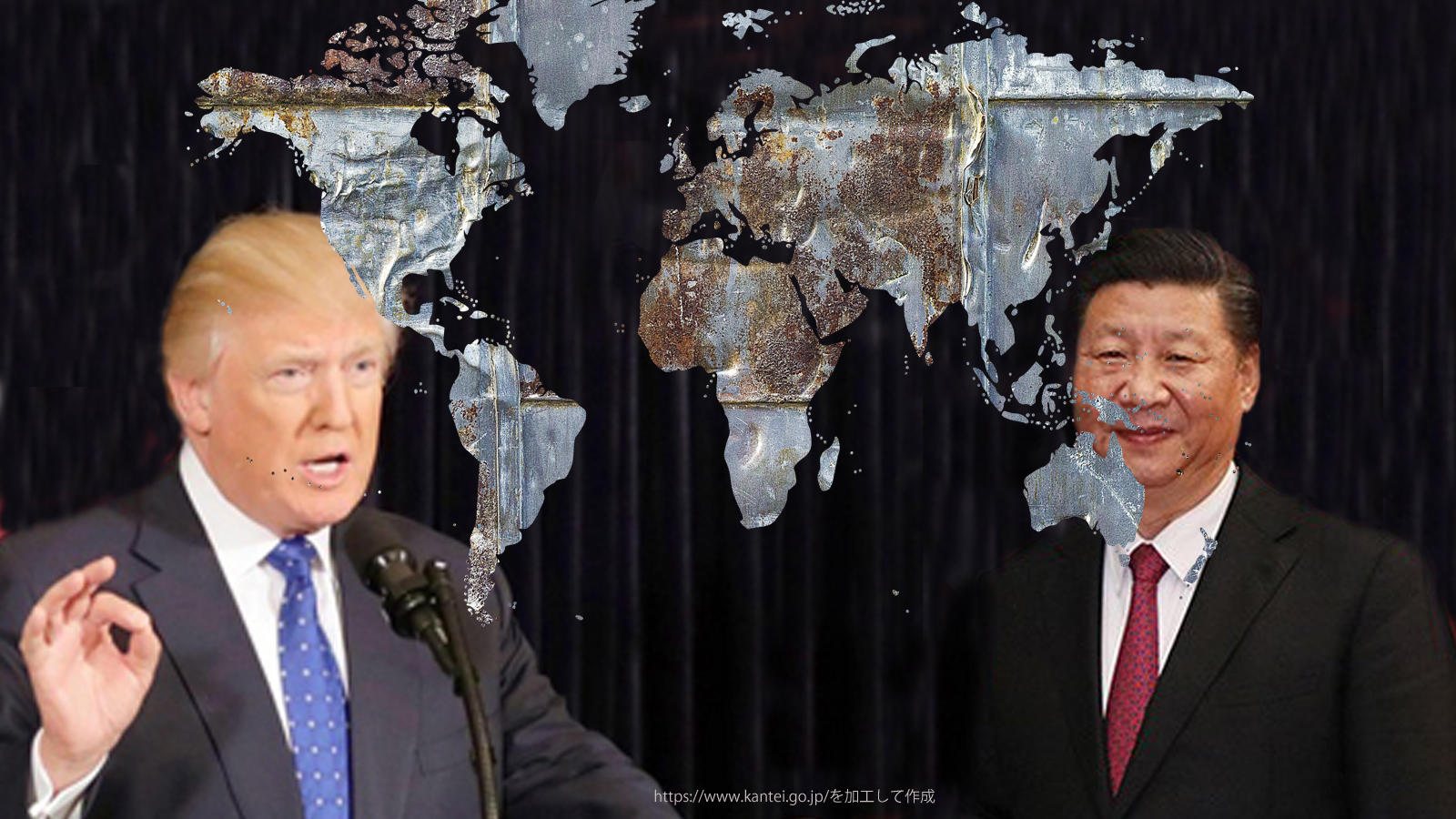The unilateral path taken by the Trump administration is threatening free trade and multilateralism, and making it increasingly difficult for the international community to tackle global issues. The world appears to at a historic turning point, but is this a shift toward a new system or merely a period of adjustment to improve the current framework?
On March 8, The Genron NPO hosted a discussion by Japanese experts on the topic of globalization and the liberal order ahead of the Tokyo Conference 2018, a public forum at which some of the world's leading think tanks explored global issues. It was the last in a series of Genron initiatives that brings together experts and intellectuals in Japan to look at the challenges facing the world. Genron NPO President Yasushi Kudo served as moderator at the discussion.

The world is facing a historic transition
 Yasuchika Hasegawa, board chairman of Takeda Pharmaceutical Co., said he was unsure where this global sea change was headed. "We are witnessing the emergence of individuals and countries where conventional order does not apply. I cannot say what kind of impact this has on society," he said. "We are in a period of transition right now and it's hard to tell where we are headed."
Yasuchika Hasegawa, board chairman of Takeda Pharmaceutical Co., said he was unsure where this global sea change was headed. "We are witnessing the emergence of individuals and countries where conventional order does not apply. I cannot say what kind of impact this has on society," he said. "We are in a period of transition right now and it's hard to tell where we are headed."
 Yoshiko Kojo, a professor of international relations at the Graduate School of Arts and Sciences at the University of Tokyo, agreed, saying it was extremely difficult to make any predictions. There is no doubt that advanced democratic nations had maintained the conventional order and people had supported such an order, Kojo said. But with more and more people feeling extremely disadvantaged by globalism, many are starting to doubt whether this order is worth supporting, and feel that multinational rules of free trade are overly regulating countries, she said.
Yoshiko Kojo, a professor of international relations at the Graduate School of Arts and Sciences at the University of Tokyo, agreed, saying it was extremely difficult to make any predictions. There is no doubt that advanced democratic nations had maintained the conventional order and people had supported such an order, Kojo said. But with more and more people feeling extremely disadvantaged by globalism, many are starting to doubt whether this order is worth supporting, and feel that multinational rules of free trade are overly regulating countries, she said.
 Naoyuki Shinohara, former deputy managing director at the International Monetary Fund (IMF) and currently a professor at the University of Tokyo's Policy Alternatives Research Institute, said this issue must be viewed in the long term. He said there are several major trends today, with multipolarity being the largest. The absolute dominance of the United States is waning, but rather than seeing, for example, China taking its place, Shinohara expects the emergence of a multipolar world, where the United States, Europe, China and perhaps India may all vie for dominance. This G-Zero world, a term coined by political scientist Ian Bremmer to describe an emerging power vacuum in international politics created by the decline in Western influence and the inward-looking focus of developing states, talks about how existing systems are destabilized, and Shinohara likewise expects this confusion to continue. "The current system has basically been built by advanced Western nations, and I believe we are currently in a process where this is gradually collapsing or transforming," Shinohara said.
Naoyuki Shinohara, former deputy managing director at the International Monetary Fund (IMF) and currently a professor at the University of Tokyo's Policy Alternatives Research Institute, said this issue must be viewed in the long term. He said there are several major trends today, with multipolarity being the largest. The absolute dominance of the United States is waning, but rather than seeing, for example, China taking its place, Shinohara expects the emergence of a multipolar world, where the United States, Europe, China and perhaps India may all vie for dominance. This G-Zero world, a term coined by political scientist Ian Bremmer to describe an emerging power vacuum in international politics created by the decline in Western influence and the inward-looking focus of developing states, talks about how existing systems are destabilized, and Shinohara likewise expects this confusion to continue. "The current system has basically been built by advanced Western nations, and I believe we are currently in a process where this is gradually collapsing or transforming," Shinohara said.
Trump's "ideal order"
 Kudo introduced a recent survey conducted by The Genron NPO, where nearly 60 percent of the respondents felt the world was becoming unstable due to the unilateralism and shortsightedness of U.S. President Donald Trump. Contrary to earlier survey results and public opinion findings that saw many claim the current hype was exaggerated and Trump will eventually revert to a more realistic course of action, the most recent survey showed only 10.7 percent of the respondents feeling there was no need for concern.
Kudo introduced a recent survey conducted by The Genron NPO, where nearly 60 percent of the respondents felt the world was becoming unstable due to the unilateralism and shortsightedness of U.S. President Donald Trump. Contrary to earlier survey results and public opinion findings that saw many claim the current hype was exaggerated and Trump will eventually revert to a more realistic course of action, the most recent survey showed only 10.7 percent of the respondents feeling there was no need for concern.
Asked if their views on how the new Trump administration will impact the world have changed in the past year, Hasegawa said he is more skeptical now, contrary to his initial expectation that despite his controversial campaign pledges, Trump would act reasonably once he took office. He said Trump is trying to keep his word, as seen in his tax cuts, trade policies, building the wall along the southern border with Mexico and moving the U.S. Embassy in Israel from Tel Aviv to Jerusalem. Trump is also motivated by a desire to deny any form of legacy to Barack Obama, hence his decision to withdraw from the Trans-Pacific Partnership (TPP), to reassess diplomatic ties with Cuba and question the Iranian nuclear deal. Hasegawa said Trump is focused on pleasing his supporters, who have not received much attention from past presidents, as that would increase his chances of survival. "That is his unwavering focus, and I don't think he has any ideal order or anything like that in mind. So, it would be too risky to try and make predictions based on him alone," Hasegawa said.
Shinohara said he believes there is no need to read too much into Trump's actions. "His actions are consistently that of a businessman, a sense of wanting to take advantage of everything," he said. It's unlikely that Trump is putting much thought into the current world order or any such long-term goals, although there is no denying that what is happening and the long-term trend that is being discussed here are related in some way, Shinohara said.
Kojo said even before Trump became president, American society had always faced the problem of a social divide. Obama also tried to address this problem but without much success. "Until today, the ability to be able to heal this divide was viewed as America's strength. But as the divide widens, it makes it easier for people like Trump or Democrat Bernie Sanders to build a support base," she said. "I am very critical of Trump's actions because he is trying to garner support by deepening this divide. He tries to build support by creating enemies within and outside the country, and such tactics of widening, rather than closing, the divide have major domestic and social consequences," she said.
Is globalization mutually beneficial?
In the second part of the discussion, the experts discussed the future of globalization and whether it is truly mutually beneficial to all. Kudo said the recent survey conducted by The Genron NPO shows that only 1 percent believe globalization in its current state is satisfactory. More people are becoming skeptical about whether globalization is indeed mutually beneficial, with many calling for the need to improve or limit it, he said.
Shinohara responded that globalization is inevitable and there is no way to stop this trend, but what is necessary is to address the problems created by globalism such as income gaps, because globalization and marketism are bound to create such disparities. Kojo agreed, adding that one country alone would not be able to address this issue. Any measures will be ineffective without multinational oversight, and governments must continue to work to build such a global statute, as well as convince their people that this is a very important process.
In the academic world of economics, the problem of income disparities is not addressed, as it is counter to the efficacy of the economy, explained Shinohara. "The debate was always about how adjusting income disparities was contrary to economic growth, hence there was no real debate about the redistribution of wealth," he said. Shinohara introduced the recent academic trend that argues that appropriate adjustment of income disparities could actually help economic growth. While the authenticity of this logic is still open to question, it may be the role of the academia and intellectuals to try and build such logic, he said.
Kojo said it was the responsibility of politicians to convince people there are matters that require patience and perseverance. "Everyone wants to get the most out of everything, but that would place a heavy burden on economic growth, so we must work to reach a consensus as to what provides the appropriate welfare and benefit for all," she said.

Hasegawa said globalization is not something that you can stop even if you want to, particularly in today's world where information and communications technology allow for extremely low-cost businesses like Uber or Air BnB to spread around the globe almost instantaneously. "But every country has a constitution that promises a healthy and cultural life for all, so we need to think about people who are oppressed, or whose income continues to fall, because of globalization," he said, calling for retraining, re-schooling and recurrent education for people disadvantaged by globalization. "We are now in a period of transition, with various endeavors taking place as globalization expands. We need to watch how these efforts take shape and whether they prove to be effective," he said, citing the example of how Finland was experimenting with the concept of a basic income.
The problem with trying to address the negative impact of globalism is that there is no common understanding of what exactly is the "mutual benefit," said Kojo. There is no nation that would put aside its own interests to realize mutual benefit for all. But without some common ground about what one considers a mutual benefit, it would be impossible to create common rules for all to follow. Kojo said there are many countries that believe globalization is beneficial to their own country, so the key is which country will take the lead in establishing such common rules. "But the problem is there appears to be no country willing to take that lead," she said.
Technological advancement and globalization
Asked about the impact of artificial intelligence (AI) and other technological advances on globalization, Hasegawa said, "I'm an ultimate optimist, so I believe all problems, whether it be food, water or energy shortages, will ultimately be solved by technology." He cited examples of how the shared economy is boosting capacity utilization and the technological advancement of renewable energy sources. Hasegawa said he even believes that by utilizing AI to maximize efficient growth of produce, humankind may ultimately be able to provide enough food for the whole global population, which is estimated to peak at 10 billion people.
Shinohara said that up until about the 1980s, the global economy continued to grow and each member of society was able to feel the benefits of such growth. But as economic growth slowed, people were unable to feel that the current system was working effectively, and efforts to boost growth, such as the advocacy of information and communications technology, are not helping as much as expected, said Shinohara. "So we just have to get used to it. When we look at policies in Japan in particular, I feel it would be better to get accustomed to this," he said.
Shinohara said concepts like sustainable development growth and the economic solvency ratio were born because the concept of gross domestic product has many problems. "I think that in itself is a good thing. There is a discrepancy between the individual's sense of wealth and the economy, and how a sustainable society should be maintained in the long term," he said.
Why democracy now?
The third session discussed the future of the world order. The Genron survey showed that while 12.4 percent of the respondents cited "multilateralism" as something that needed to be protected the most, 51 percent cited "basic human rights," 44.8 percent said "democracy" and 37.9 percent said "rule of law." What is the significance of seeing so many people cite democracy as something to be protected?
Hasegawa said that while democracy has many problems, there has yet to be a form of governance that is more superior. Hence democracy needs to transform itself to respond to the needs of the times.

As the world sees more nations with stronger authoritarian tendencies, Kojo said that the survey results show more people identifying the need to protect democracy. But the fact that we see such nations also indicates that current politics is not functioning and overall social discontent is causing people to seek a strong leader, rather than democracy, to solve their problems.
Shinohara said the prevalence of countries like China and Russia, as well as developing nations with strong individual leaders that try to control society indicates that democracy appears to be failing, and expressed concern that individual human rights may be violated. "But the problem is that people around the world are starting to appreciate China-like systems. They know the system is problematic, but it is fairly successful in controlling the economy ... everybody appears to be happy, and they think there is a possibility that this form of governance may be an alternative to conventional democracy. Not that I like it," Shinohara said.
A new global order with China
Asked whether a new system including China under a new set of rules and norms was in the making, Shinohara said he finds that unlikely for the time being. He denied views that the United States is trying to abandon its conventional role under the Trump administration, and that it was only a problem of wanting to, but being unable to, play its role under current circumstances. Meanwhile, China's influence is growing stronger with other nations approaching the Asian giant without its beckoning, while Europe is wading somewhere in between. "Even if a new order was to be formed, it would take a considerable amount of time. And in the meantime, things will remain unstable," Shinohara said.
China will follow existing global rules if it finds merit in doing so, but will try to change them to maximize its influence, Kojo said. China is trying to create its own multinational framework on its terms, but there is opposition and it can't accomplish such a feat alone. So, it is trying to alter the existing order to suit its needs, she said. For example, the World Trade Organization (WTO) does not see China as a completely free economy nation, but China says it doesn't care how the WTO views it. That may be one way of trying to alter the existing order to suit itself, Kojo said.
China remains extremely passive about participating in global multinational systems, Shinohara said. If it were offered, China would probably be willing to accept an increased IMF quota that would give it more power and say in the organization, but it won't come asking for it. "It appears as if they are saying, 'We will do our thing on our own. We'll keep an eye out for the Asian region, but we're not interested in serving as a global player.' China does not see any merit in aggressively leading the world," he said.
The only country that has succeeded in putting an authoritarian slant on democracy is Singapore, but Hasegawa said that was only possible because Singapore has a population of 5 million people, while China must try to please its 1.2 billion people. "China is trying to become a country that is indispensable to nations within its sphere of influence. There are over 80 countries that have China as their largest trade partner, and to them, China is indispensable," he said. Meanwhile, the United States is much stronger in terms of its economy and military might, as well as having different alliances around the world, including that with Japan, South Korea and NATO. China is trying to seek out the best course of action within such limitations, Hasegawa said.
Meanwhile, the Group of 20 is based on consensus and has no legitimacy or power to force all parties to abide. It will be no easy task to create an international structure that satisfies China, Europe, the United States and Japan, so the conclusion is that we go as far as we can under the current framework, Hasegawa said.

How can Japan contribute to maintaining global order?
Asked about Japan's role in the future of global order, Shinohara said Japan overall is suffering from the "Galapagos syndrome," with its society and economic activity in the private sector isolated from global action. "Japan needs to think more about itself and what direction it wants to take, or nobody will listen to us," Shinohara said. Japan has a voice in the global community due to its past accomplishments, but with neighboring nations growing rapidly, Japan may end up being merely a tributary state to the United States, he said. "Japan must once and for all decide whether to jump on the wave of globalization, or return to the days of sakoku ('closed country') seclusion."

Kojo urged Japan to play its part by persuading the United States to abandon any form of protectionism. Since the birth of the Trump administration, efforts to discuss the international order and handle global issues have weakened substantially, Kojo said. When a superpower like the United States decides to implement protectionist policies, other countries will follow suit, causing a chain reaction of retaliation, and international cooperation goes out the window. The United States caused a similar chain reaction in the 1930s with its Smoot-Hawley Tariff imposed on over 20,000 imported goods, and repeating that now is problematic from the standpoint of the stability of global politics. "It will be important for Japan to urge Washington to avoid adopting such protectionist policies," she said.
The biggest problem for Japan is that the long-ruling Liberal Democratic Party has failed to show its future vision for this country and seek a vote of confidence from the people, said Hasegawa. "A nation needs to create a vision of its future, 30, 50 years from now, and think about what Japan, with its limited resources, can do. Then Japan might be able to take the global lead on issues like the Sustainable Development Goals or universal health coverage," he said.
In closing, Kudo once again noted how the survey showed an increased sense of urgency among respondents that democracy was facing a crisis, and urged not only the Japanese government, but the voters to take action to protect the liberal system.

Post a comment